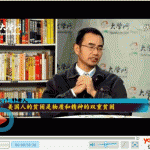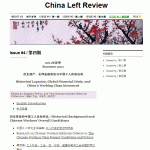
Utopia has up an very interesting, lengthy and wide-ranging interview with Han Deqiang on the ‘Occupy Wall Street’ protests. It tries to put the protests in a larger context of ‘globalization’, which Han explains as mainly the result of the strategy of companies in developed countries to boost their profits by moving production to developing countries, such as China. Along the way there’s an interesting discussion of poverty in the US, and a simple primer about ‘Who Rules America?”
Unfortunately, despite Han’s own explanation, and the interviewer’s faithful adherence to Han’s logic, in the end Chinese workers are told to enter into a united front with Chinese capital. Sigh.

From the middle of September, a great “Wall Street Revolution” has broken out in the United States. This street revolution, going by the name of “Occupy Wall Street,” has already expanded to over 70 cities and countries in North America, Europe, and other areas. In their statement on “The Wall Street Revolution,” the American people have sworn that this demand for “a democratic country, not a corporate kingdom” mass democratic revolution must spread to every part of the world, and they will not rest until this goal is met. From the anti-capitalist demonstrations that began after the 2008 financial crisis, and which this year have spread across Europe, the Middle East, North Africa and South America, this magnificent global mass democratic movement has finally spread to the center of capitalism’s financial empire-Wall Street.

Issue #4 of the web-journal China Left Review is now online. The latest issue is tightly focused on the issue of workers, including general overviews and in-depth original pieces on recent large-scale labor struggles involving SOE workers and migrant workers. This marks the second fully bilingual edition of CLR. Producing an issue in two languages takes a great deal of effort, and if you’d like to help out with translating, revising or writing for future issues, please contact [email protected].

BookTV has an excellent, in-depth interview with James Peck on his new book, Ideal Illusions: How the U.S. Government Co-opted Human Rights. There’s a short clip up at Youtube, but the longer talk and Q&A is well worth watching in its entirety.
Here’s the book’s blurb:
The United States has long been hailed as a powerful force for global human rights. Now, drawing on thousands of documents from the CIA, the National Security Council, the Pentagon, and development agencies, James Peck shows in blunt detail how Washington has shaped human rights into a potent ideological weapon for purposes having little to do with rights—and everything to do with furthering America’s global reach.
Using the words of Washington’s leaders when they are speaking among themselves, Peck tracks the rise of human rights from its dismissal in the cold war years as “fuzzy minded” to its calculated adoption, after the Vietnam War, as a rationale for American foreign engagement. He considers such milestones as the fight for Soviet dissidents, Tiananmen Square, and today’s war on terror, exposing in the process how the human rights movement has too often failed to challenge Washington’s strategies.

China’s reform of its health care system in the latter half of the 1990s and early years of the new millennium was pretty much a disaster. See Wang Shaoguang’s piece published here, and if you have journal access, I would recommend Wang’s recent article State extractive capacity, policy orientation, and inequity in the financing and delivery of health care in urban China. Chen Meei Shia’s article also gives a great overview of what’s changed since the Mao era: The Great Reversal: Transformation of Health Care in the People’s Republic of China.
So it is especially encouraging to see that as more and more people are added to China’s municipal and provincial health insurance plans, the government is starting to flex its bargaining power:

Originally posted at http://www.clntranslations.org/article/62/strike+law
Even though strikes frequently occur across China, the country actually has no law regulating labor strikes. There is no law permitting strikes, but at the same time there is no law banning them. After the high-profile strike wave in the automotive sector last year, a small number of public comments were published in China, online and in the print media, discussing the question of whether or not there should be legislation about workers’ right to strike. In this issue of CLNT we provide …